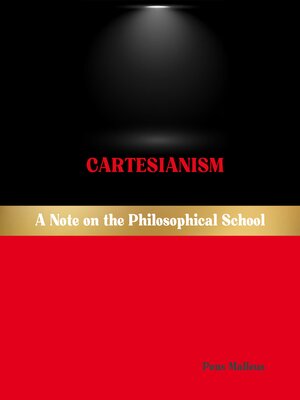Cartesianism
audiobook (Unabridged) ∣ A Note on the Philosophical School · Western Philosophical Schools
By Pons Malleus

Sign up to save your library
With an OverDrive account, you can save your favorite libraries for at-a-glance information about availability. Find out more about OverDrive accounts.
Find this title in Libby, the library reading app by OverDrive.



Search for a digital library with this title
Title found at these libraries:
| Library Name | Distance |
|---|---|
| Loading... |
This audiobook is narrated by a digital voice.
The story of Western philosophy cannot be told without acknowledging a decisive turning point in the 17th century—a moment when doubt became a tool, reason became sovereign, and the self emerged as the foundation of knowledge. At the center of this transformation stands René Descartes, the father of modern philosophy, whose work gave rise to the school of thought known as Cartesianism. This book is dedicated to exploring that philosophical tradition—not merely as a historical phenomenon, but as a living and provocative approach to some of the most enduring questions of human existence.
Cartesianism begins with a radical proposal: to doubt everything that can be doubted in order to arrive at something that cannot. It is from this method of systematic skepticism that Descartes arrives at his most famous conclusion: Cogito, ergo sum—"I think, therefore I am." From that seemingly modest insight, Descartes builds an entire philosophical system, one that seeks certainty in a world filled with uncertainty. He distinguishes the thinking mind (res cogitans) from the extended body (res extensa), introduces a dualistic view of human nature, and grounds knowledge in reason rather than the senses.
But Cartesianism is not simply the philosophy of Descartes. It is a tradition that grew, evolved, and was contested by his contemporaries and successors. Figures such as Nicolas Malebranche, Baruch Spinoza, and Antoine Arnauld developed, challenged, or reinterpreted Descartes' ideas, pushing the boundaries of Cartesian dualism, causality, and the relationship between God, mind, and matter. Even critics of Cartesianism, such as empiricists and existentialists, often define themselves in contrast to its premises.
This book offers a comprehensive account of Cartesianism as both a historical movement and a philosophical framework.







